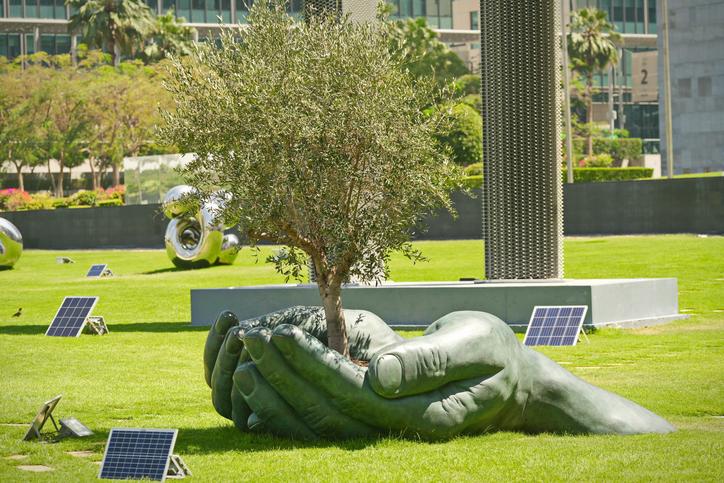
In-person events are still necessary
Should academics be travelling to events that could be done virtually? Drawing on her experiences at COP28, Denise Baden shares tips on how to make the most of these events – and why a chance to form alliances, learn from each other and share ideas for action make it worth being present
You may also like
Popular resources
The United Nations Conference of the Parties (COP) events have been criticised for the carbon emissions created when thousands of delegates take long-haul flights to get there. Some claim that Zoom meetings would be preferable. I worried about this myself and gave several virtual talks at COP27.
However, my first in-person attendance, at COP28 in Dubai, has convinced me of the value of meeting physically. Everyone I met was in the climate game and had useful insights to share, enabling me to cross-check points made by others to see which ideas stood up to scrutiny.
COPs attract international media attention as member states gather to agree policies associated with climate change. COP28, which was held over two weeks in November and December, had a record 84,000 attendees, including leading scientists, journalists and members of the public. It’s a key annual event in which the higher education sector has a clear role to play.
- Using partnerships to establish and build on project success
- A practical approach to tackling eco-anxiety
- THE podcast: universities aren’t too small to lead the climate crisis fight
Here are strategies I have learned to maximise the benefits that in-person events can bring for individual researchers and HE.
Make the most of incidental networking opportunities
We are all, rightly, under pressure to integrate the UN’s sustainable development goals into our teaching. In my view, the most pressing of these relate to the need to rapidly reduce greenhouse gas emissions before we pass tipping points that we can’t come back from.
However, to do this well, we need to stay up to date with the latest climate solutions. Many ideas that sound great in practice solve one problem by creating another. Some won’t work or will only work with trial and error and huge investment. But we must find a way to sort the wheat from the chaff.
I’ve learned the necessity of this from experience. I’ve been running a sustainable hairdressing project for more than a decade and initially thought sustainable palm oil was a green alternative. It isn’t, and thinking it is matters when around half of the products sold in supermarkets contain palm oil. The green solution is using less – shampooing less often, supplementing with dry shampoo and using options such as leave-in conditioner. This reduces the carbon footprint of haircare by several thousand per cent, because most of the carbon footprint of hair care is in the energy used to heat hot water. Less resource-intensive hair-care routines are also better for the hair and skin, less time-consuming and save money. It’s a great example of how using less increases rather than decreases our quality of life.
But this is not a message you will get from businesses that profit from unnecessary consumption. I had no sooner voiced the question of how to address the issue of marketing than the person sitting next to me on the metro home had a solution. His proposal was to charge a dollar for every dollar spent on advertising. The money goes into a central fund to be distributed to carbon dioxide removal projects. I loved it! I’d spent time throughout 2023, checking out the UN website, contacting the names of coordinators of the various pavilions at COP to see where I could usefully contribute, but I got just as much from these kinds of unplanned encounters by simply talking to the person next to me.
Use speaking invitations to form or reinforce connections
I did a joint talk with a fellow climate fiction writer, engineer Steve Wallis, who has turned to writing novels to share details of projects that would make a difference, as well as a form of therapy for himself. I had worked with him on an anthology for COP27 called No More Fairy Tales: Stories to Save our Planet. Our discussions led to development of a new novel, Fairhaven, with which we aim to present a vision of a workable future through the story of a young Malaysian engineer who works on a huge climate adaptation and mitigation project. Steve sees it as a blueprint for action for low-lying lands such as Penang.
Seek out like-minded scholars
Also at COP28, I bonded with a couple who ran the “extreme hangout zone” over our shared desire to engage wider audiences in climate action. They liked my Green Stories Project, and I loved their approach, which was to engage sports celebrities in spreading the climate message. I’m based at the University of Southampton, UK, and we have celebrity football players. We discussed hosting an extreme hangout where a local football player would bring in the crowds with a talk on what young people can do about the climate crisis. The advice here is to introduce yourself. People are there to network, learn and share. If they’re there, they’re almost certainly keen to talk about why. Despite the shared theme of climate, there was a clear division between those who thought we could continue with business as usual and those who didn’t. It’s easy to find those on your wavelength, but often you can learn just as much from those who aren’t.
How to turn in-person events into successful engagement
This is what COP28 offers – a chance to form alliances, learn from each other and share ideas for action. It is an invaluable forum for meeting kindred spirits, bouncing ideas around and forming collaborative partnerships.
Take with you an open mind and eagerness to learn, and if you get tired, just sit on a bench and talk to the person next to you. The chances are that either you or they will learn something useful.
Denise Baden is a professor of sustainable business in the Southampton Business School and lead on the Green Stories Project at the University of Southampton.
If you would like advice and insight from academics and university staff delivered direct to your inbox each week, sign up for the Campus newsletter.




